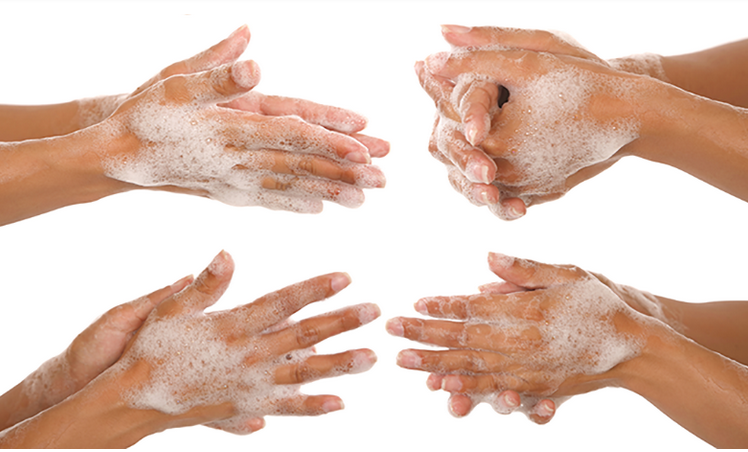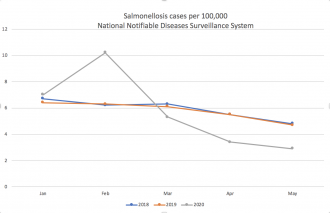Media release
From: Food Safety Information CouncilThe Food Safety Information Council today released a report card on Australia’s food safety record in recognition of the Second UN World Food Safety Day to be held on 7 June 2020 with the theme ‘Food Safety: Everyone’s Business’.
Council Chair, Cathy Moir, said that in a normal year there are an estimated 4.1 million cases of food poisoning in Australia each year that result in 31,920 hospitalisations, 86 deaths and 1 million visits to doctors on average.
‘Some good news is that, since the COVID-19 lockdown began in March 2020, reported rates of Campylobacter and Salmonella infections per 100,000 people in Australia have almost halved compared with the previous two years. There have been drops in other infectious diseases such as influenza and measles during this period which shows how effective good handwashing and social distancing can be in controlling infectious diseases. Also, food poisoning is more commonly identified when food is prepared in bulk and there has been less entertaining and eating out with larger groups of people during the lockdown.
‘But we mustn’t become complacent – our 2019 handwashing study found 29% of Australians said they didn’t always wash their hands after going to the toilet and more than a third admit they don’t always wash their hands before touching food. Now we have better handwashing as a result of COVID-19 we urge people to continue to wash their hands often even after the pandemic ends.
‘Our recent consumer research has highlighted some areas where we need to improve. For example, among Australians:
- one-third of all households have at least one vulnerable person at risk of severe illness if they get food poisoning, for example pregnant women, the elderly and people with reduced immunity;
- 70% of people don’t know the safe cooking temperature for foods such as poultry and egg dishes, that may be contaminated with Salmonella and Campylobacter; and
- one in four adults are taking a food safety risk by eating raw or undercooked egg dishes especially as 12% of them eat these foods at least monthly.
‘Also, as you return to work, follow all the COVID-19 safety advice in your workplace as well as these food safety tips:
- Keep washing your hands often with soap and running water and dry thoroughly before handling food, touching your face or hair, blowing your nose and after going to the toilet. If soap, hand sanitiser or paper towels are running low make sure they are restocked.
- Don’t go to work if you are feeling unwell, either with respiratory or ‘gastro’ symptoms.
- Some workplaces may now have restrictions about using shared kitchen equipment so you may have to supply your own cup, cutlery and plate. If there is no dishwasher in the shared kitchen you might like to do this anyway.
- If you do not have access to a communal fridge or microwave remember your lunch can keep cool if you bring it to work in a small insulated container with an ice block or frozen drink (or, if you can afford it, you can support your local businesses by picking up takeaway for lunch).
‘We are also announcing that the theme for Australian Food Safety Week 14 to 21 November 2020 will be ‘Food Safety – it’s in your hands’ where we will be building upon the good behaviour established during the COVID-19 pandemic so we can continue to reduce the amount of foodborne disease.
‘Australian Food Safety Week 2019 and our summer campaign about egg safety was a considerable success and reached a total media audience of over 2 million. Our radio and TV community service announcements ran nationally and our video was screened in doctors’ surgeries, health centres, hospitals and pharmacies in December 2019 and January 2020 where it reached an audience of over 15 million. National Omnipoll research found that 24% of Australian adults recall hearing egg safety messages over the Summer which equals approximately 5 million Australians.
‘This year is a particularly difficult time for charities like ourselves, so we are inviting organisations who may wish to become involved in sponsoring the 2020 Australian Food Safety Week to contact us on 0407 626 688 or at info@foodsafety.asn.au,’ Ms Moir concluded.
The Food Safety Information Council is a health promotion charity and Australia’s leading disseminator of consumer-targeted food safety information.
To find more information about these issues please visit our web site at www.foodsafety.asn.au
Media contact:
Lydia Buchtmann, Food Safety Information Council, 0407 626 688 or info@foodsafety.asn.au




